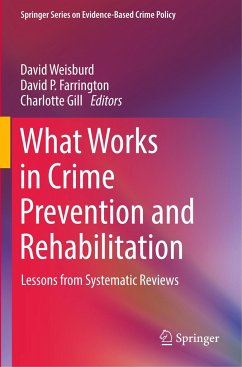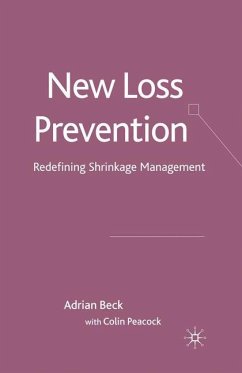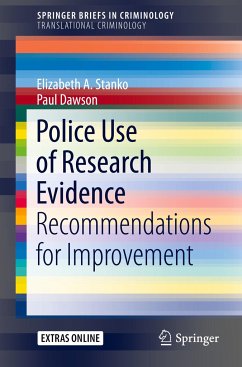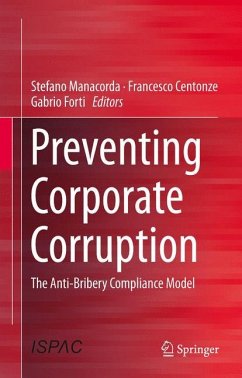
What Works in Crime Prevention and Rehabilitation
Lessons from Systematic Reviews
Herausgegeben: Weisburd, David; Farrington, David P.; Gill, Charlotte

PAYBACK Punkte
61 °P sammeln!
This ambitious volume brings together and assesses all major systematic reviews of the effectiveness of criminological interventions, to draw broad conclusions about what works in policing, corrections, developmental prevention, situational prevention, drug abuse treatments, sentencing and deterrence, and communities.Systematic reviews aim to minimize any possible bias in drawing conclusions by stating explicit criteria for inclusion and exclusion of studies, by conducting extensive and wide-ranging searches for possibly eligible studies, and by making all stages of the review explicit and tra...
This ambitious volume brings together and assesses all major systematic reviews of the effectiveness of criminological interventions, to draw broad conclusions about what works in policing, corrections, developmental prevention, situational prevention, drug abuse treatments, sentencing and deterrence, and communities.
Systematic reviews aim to minimize any possible bias in drawing conclusions by stating explicit criteria for inclusion and exclusion of studies, by conducting extensive and wide-ranging searches for possibly eligible studies, and by making all stages of the review explicit and transparent so that the methods can be checked and replicated. Over a decade ago, a concerted effort was made by members of the criminology community, including the Editors and contributors of this volume, to bring the practice of systematic reviews to the study of Criminology, providing replicable, evidence-based data to answer key questions about the study of crime causation, detection, and prevention. Now, the pioneers in this effort present a comprehensive stock-taking of what has been learned in the past decade of systematic reviews in criminology. Much has been discovered about the effectiveness of (for example) boot camps, "hot spots" policing, closed-circuit television surveillance, neighborhood watch, anti-bullying programs in schools, early parenting programs, drug treatment programs, and other key topics.
This volume will be of interest to researchers in criminology and criminal justice, as well as in related fields such as public health and forensic science, with important implications for policy-makers and practitioners.
Decisively showing that the "nothing works" era is over, this volume takes stock of what we know, and still need to know, to prevent crime. I plan to keep this book close at hand and to use it often!
Francis T. Cullen, Distinguished Research Professor Emeritus,
University of Cincinnati At a time when there is a broad commitment to bringing science to the front lines of practice, this book should be on the reading list of both policymakers and scholars.
Laurie O. Robinson, Clarence J. Robinson Professor of Criminology, Law Society, George Mason University and former Assistant Attorney General of the U.S. Department of Justice
Systematic reviews aim to minimize any possible bias in drawing conclusions by stating explicit criteria for inclusion and exclusion of studies, by conducting extensive and wide-ranging searches for possibly eligible studies, and by making all stages of the review explicit and transparent so that the methods can be checked and replicated. Over a decade ago, a concerted effort was made by members of the criminology community, including the Editors and contributors of this volume, to bring the practice of systematic reviews to the study of Criminology, providing replicable, evidence-based data to answer key questions about the study of crime causation, detection, and prevention. Now, the pioneers in this effort present a comprehensive stock-taking of what has been learned in the past decade of systematic reviews in criminology. Much has been discovered about the effectiveness of (for example) boot camps, "hot spots" policing, closed-circuit television surveillance, neighborhood watch, anti-bullying programs in schools, early parenting programs, drug treatment programs, and other key topics.
This volume will be of interest to researchers in criminology and criminal justice, as well as in related fields such as public health and forensic science, with important implications for policy-makers and practitioners.
Decisively showing that the "nothing works" era is over, this volume takes stock of what we know, and still need to know, to prevent crime. I plan to keep this book close at hand and to use it often!
Francis T. Cullen, Distinguished Research Professor Emeritus,
University of Cincinnati At a time when there is a broad commitment to bringing science to the front lines of practice, this book should be on the reading list of both policymakers and scholars.
Laurie O. Robinson, Clarence J. Robinson Professor of Criminology, Law Society, George Mason University and former Assistant Attorney General of the U.S. Department of Justice














